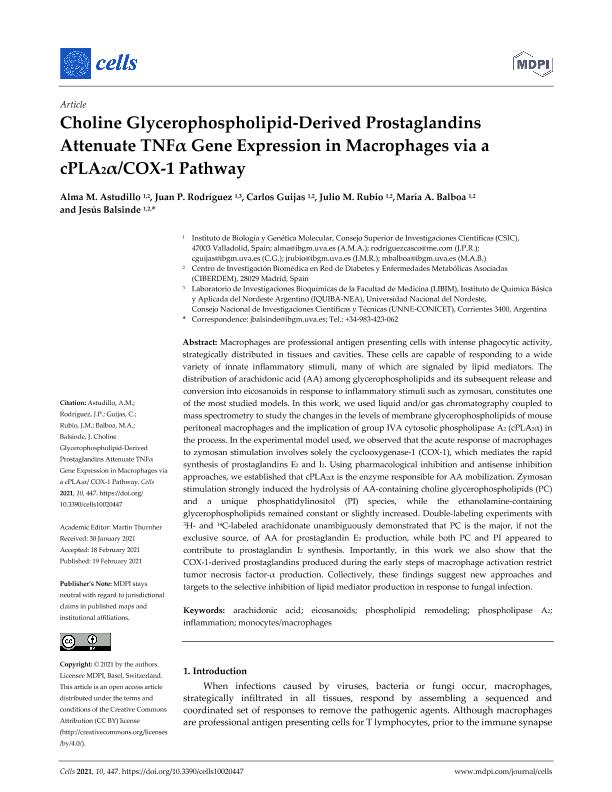Artículo
Choline Glycerophospholipid-Derived Prostaglandins Attenuate TNFα Gene Expression in Macrophages via a cPLA2α/COX-1 Pathway
Astudillo, Alma M.; Rodríguez, Juan Pablo ; Guijas, Carlos; Rubio, Julio M.; Balboa, María A.; Balsinde Rodríguez, Jesús
; Guijas, Carlos; Rubio, Julio M.; Balboa, María A.; Balsinde Rodríguez, Jesús
 ; Guijas, Carlos; Rubio, Julio M.; Balboa, María A.; Balsinde Rodríguez, Jesús
; Guijas, Carlos; Rubio, Julio M.; Balboa, María A.; Balsinde Rodríguez, Jesús
Fecha de publicación:
02/2021
Editorial:
MDPI
Revista:
Cells
ISSN:
2073-4409
Idioma:
Inglés
Tipo de recurso:
Artículo publicado
Clasificación temática:
Resumen
Macrophages are professional antigen presenting cells with intense phagocytic activity, strategically distributed in tissues and cavities. These cells are capable of responding to a wide variety of innate inflammatory stimuli, many of which are signaled by lipid mediators. The distribution of arachidonic acid (AA) among glycerophospholipids and its subsequent release and conversion into eicosanoids in response to inflammatory stimuli such as zymosan, constitutes one of the most studied models. In this work, we used liquid and/or gas chromatography coupled to mass spectrometry to study the changes in the levels of membrane glycerophospholipids of mouse peritoneal macrophages and the implication of group IVA cytosolic phospholipase A2 (cPLA2 α) in the process. In the experimental model used, we observed that the acute response of macrophages to zymosan stimulation involves solely the cyclooxygenase‐1 (COX‐1), which mediates the rapid synthesis of prostaglandins E2 and I2. Using pharmacological inhibition and antisense inhibition approaches, we established that cPLA2α is the enzyme responsible for AA mobilization. Zymosanstimulation strongly induced the hydrolysis of AA‐containing choline glycerophospholipids (PC) and a unique phosphatidylinositol (PI) species, while the ethanolamine‐containing glycerophospholipids remained constant or slightly increased. Double‐labeling experiments with 3H‐ and 14C‐labeled arachidonate unambiguously demonstrated that PC is the major, if not the exclusive source, of AA for prostaglandin E2 production, while both PC and PI appeared tocontribute to prostaglandin I2 synthesis. Importantly, in this work we also show that the COX‐1‐derived prostaglandins produced during the early steps of macrophage activation restrict tumor necrosis factor‐α production. Collectively, these findings suggest new approaches and targets to the selective inhibition of lipid mediator production in response to fungal infection.
Archivos asociados
Licencia
Identificadores
Colecciones
Articulos(IQUIBA-NEA)
Articulos de INSTITUTO DE QUIMICA BASICA Y APLICADA DEL NORDESTE ARGENTINO
Articulos de INSTITUTO DE QUIMICA BASICA Y APLICADA DEL NORDESTE ARGENTINO
Citación
Astudillo, Alma M.; Rodríguez, Juan Pablo; Guijas, Carlos; Rubio, Julio M.; Balboa, María A.; et al.; Choline Glycerophospholipid-Derived Prostaglandins Attenuate TNFα Gene Expression in Macrophages via a cPLA2α/COX-1 Pathway; MDPI; Cells; 10; 2; 2-2021; 1-15
Compartir
Altmétricas



